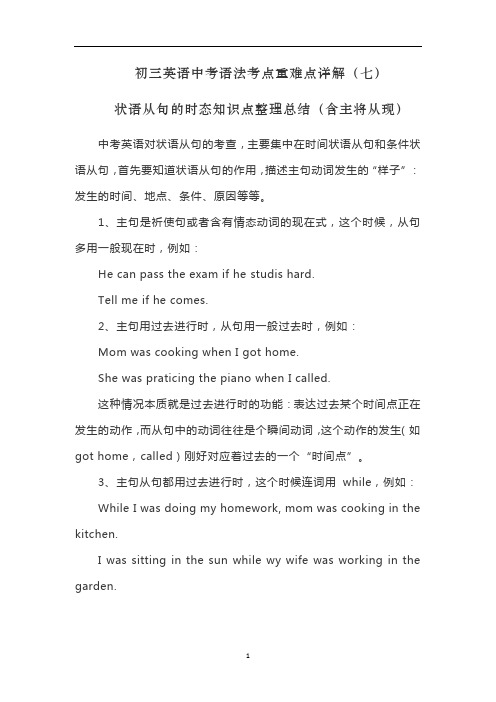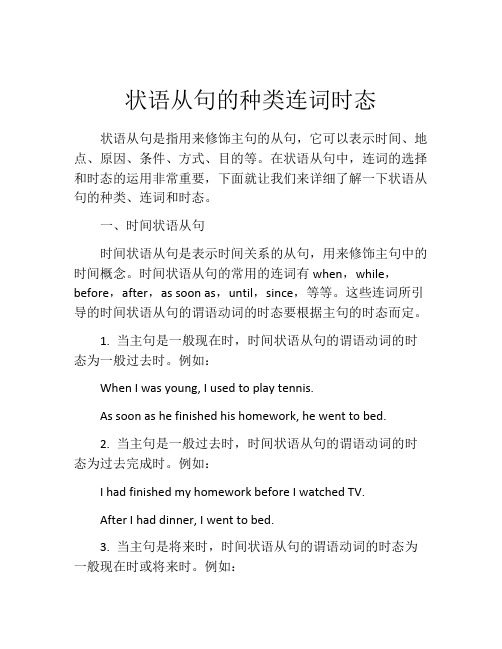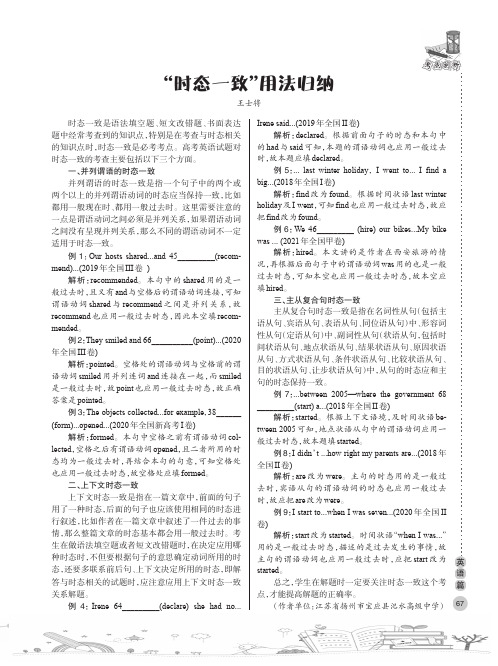时间状语从句和条件状语从句的时态一致表解
(完整版)状语从句的讲解最全的状语从句讲解

状语从句的讲解就是用一句话作状语分为:时间,地点,方式,原因,结果,条件,让步,目的,比较一、时间状语从句第一次见到你一见到你我就喜欢上了你直到见到你五岁时见到你When, as, while, before, after, since, till/until, as soon as no sooner…than…scarcely…when…hardly…when… the minute the second the instant the moment by the time 截止 immediately instantly directlyeach time every time next time the first time on doing sthwhenwhile 当…时as1。
when 1)当…时/ 延续性动词短暂性动词都可用2)这时/3)届时、到时I was watching TV when my cellphone suddenly rang这时When I was five years old I could speak five languagesThe wet weather will continue tommorow when a cold front is expected to arrive届时到时注意:时间状语从句中动作发生有前后时先发生的用过去完成时When my mother came back I had already gone to bed.2。
while 1)从句动词延续性2)同时发生3)对比的意味“然而”4)趁着He taught himself while he worked in a bank 延续性动词当他在银行上班时While we were working they were having a rest.对比While they were having a discussion , they got very confused。
初三英语中考语法考点重难点详解(七)状语从句的时态知识点整理总结(含主将从现)

初三英语中考语法考点重难点详解(七)状语从句的时态知识点整理总结(含主将从现)中考英语对状语从句的考查,主要集中在时间状语从句和条件状语从句,首先要知道状语从句的作用,描述主句动词发生的“样子”:发生的时间、地点、条件、原因等等。
1、主句是祈使句或者含有情态动词的现在式,这个时候,从句多用一般现在时,例如:He can pass the exam if he studis hard.Tell me if he comes.2、主句用过去进行时,从句用一般过去时,例如:Mom was cooking when I got home.She was praticing the piano when I called.这种情况本质就是过去进行时的功能:表达过去某个时间点正在发生的动作,而从句中的动词往往是个瞬间动词,这个动作的发生(如got home,called)刚好对应着过去的一个“时间点”。
3、主句从句都用过去进行时,这个时候连词用while,例如:While I was doing my homework, mom was cooking in the kitchen.I was sitting in the sun while wy wife was working in the garden.这种情况其实是考试连词while的含义:在……的过程中,这样从句的动词就需要一个“延续性”动词,才能和while 配合完美。
4、关于条件句的用法,是出题人最喜欢采用的If he comes, give him the picture.(主句是祈使句,天剑局是一般现在时)If we try our best, we'll get good grades.主将从现是一般原则,但是要注意也有很多不是主将从现的主从句配合。
补充知识点:“主将从现”首先我们知道一个句子的成分包含,“主谓宾定状补”,那么在句中作状语的从句称为状语从句。
时间状语从句与条件状语从句的区别与用法解析

时间状语从句与条件状语从句的区别与用法解析状语从句是复合句中的一种从句,用来修饰主句的动词、形容词、副词或整个句子。
其中,时间状语从句和条件状语从句是两种常见的状语从句类型。
本文将重点讨论这两种从句的区别和用法。
一、时间状语从句时间状语从句是用来表示时间关系的从句。
它通常由引导词“when (当……时候)”、“while(当……期间)”、“as(当……时)”等引导。
时间状语从句对主句的时间进行修饰或限定。
1.用法示例:(1)I will call you when I arrive home.(当我到家的时候,我会给你打电话。
)(2)While I was cooking, the phone rang.(我在做饭的时候,电话响了。
)(3)As she was walking in the park, she met her old friend.(当她在公园散步时,她遇见了她的老朋友。
)2.注意事项:(1)时间状语从句通常放在主从句之中,但也可以放在主句之前,此时主句要倒装,如“Not until”等引导的时间状语从句。
(2)当主句是一般将来时,时间状语从句可以用一般现在时、一般过去时或过去完成时表示将来的动作或状态。
(3)当主句是现在进行时或过去进行时,时间状语从句可用一般现在时或过去完成时。
二、条件状语从句条件状语从句是用来表示条件关系的从句。
它通常由引导词“if(如果)”、“unless(除非)”、“provided that(只要)”等引导。
条件状语从句对主句发生的条件进行修饰或限定。
1.用法示例:(1)If it rains tomorrow, we will stay at home.(如果明天下雨,我们会呆在家里。
)(2)You will pass the exam unless you study hard.(除非你努力学习,否则你会通过考试。
)(3)You can come to the party provided that you bring a gift.(只要你带礼物来,你可以来参加聚会。
状语从句与条件句的区别及用法解析

状语从句与条件句的区别及用法解析在语法中,状语从句和条件句是两种不同的句子结构,它们在用法上有一些明显的区别。
本文将对状语从句和条件句的区别进行详细解析,并提供一些使用状语从句和条件句的实例。
一、状语从句的定义和用法状语从句是一个从句,用来修饰主句中的动词、形容词或副词,并对其进行补充或限制。
状语从句通常由连词引导,如“当”、“虽然”、“因为”、“如果”等。
下面是一些常见的状语从句引导词:1. 时间状语从句:当、如果、直到、每次等。
例如:当我醒来时,天已经亮了。
2. 原因状语从句:因为、由于、既然、假如等。
例如:由于下雨,我没有去游泳。
3. 条件状语从句:如果、除非、只要、假如等。
例如:如果你来,我会很高兴。
4. 结果状语从句:所以、因此、以致、结果等。
例如:她很努力学习,所以成绩很好。
二、条件句的定义和用法条件句是一种句子结构,用来表示一个条件或假设,并在条件满足时提供特定的结果或后果。
条件句通常由连词引导,如“如果”、“除非”、“只要”等。
根据条件句的形式和含义的不同,条件句可以分为三种类型:真实条件句、虚拟条件句和非真实条件句。
1. 真实条件句真实条件句表示一个真实的条件和结果,通常用于描述普遍真实、可能发生的情况。
它的结构是:“如果+简单现在时,将来时”或“如果+一般现在时,一般现在时”。
例如:如果你学习努力,你将会取得好成绩。
2. 虚拟条件句虚拟条件句用来表示与事实相反或不可能实现的条件和结果。
它的结构是:“如果+过去时态,情态动词+动词的过去分词(用来表示过去的情况)或 would/could/might+动词原形(用来表示将来的情况)”。
例如:如果我是你,我会做出不同的选择。
3. 非真实条件句非真实条件句用于表示与现实相反或无法实现的情况,并且与过去事实无关。
它的结构是:“如果+过去完成时,情态动词+动词的过去完成时”。
例如:如果我早点到达,我就不会错过飞机。
三、状语从句和条件句的区别状语从句和条件句在用法上有以下几个明显的区别:1. 位置不同:状语从句可以出现在主句之前或之后,而条件句通常出现在主句之后。
状语从句的种类连词时态

状语从句的种类连词时态状语从句是指用来修饰主句的从句,它可以表示时间、地点、原因、条件、方式、目的等。
在状语从句中,连词的选择和时态的运用非常重要,下面就让我们来详细了解一下状语从句的种类、连词和时态。
一、时间状语从句时间状语从句是表示时间关系的从句,用来修饰主句中的时间概念。
时间状语从句的常用的连词有when,while,before,after,as soon as,until,since,等等。
这些连词所引导的时间状语从句的谓语动词的时态要根据主句的时态而定。
1. 当主句是一般现在时,时间状语从句的谓语动词的时态为一般过去时。
例如:When I was young, I used to play tennis.As soon as he finished his homework, he went to bed.2. 当主句是一般过去时,时间状语从句的谓语动词的时态为过去完成时。
例如:I had finished my homework before I watched TV.After I had dinner, I went to bed.3. 当主句是将来时,时间状语从句的谓语动词的时态为一般现在时或将来时。
例如:I will call you as soon as I arrive in Shanghai.He will stay in New York until he finds a job.二、地点状语从句地点状语从句是表示地点关系的从句,用来修饰主句中的地点概念。
地点状语从句的常用的连词有where,wherever,等等。
这些连词所引导的地点状语从句的谓语动词的时态一般和主句保持一致。
例如:I will meet you where we agreed.Wherever you go, I will follow you.三、原因状语从句原因状语从句是表示原因关系的从句,用来修饰主句中的原因概念。
“时态一致”用法归纳

时态一致是语法填空题、短文改错题、书面表达题中经常考查到的知识点,特别是在考查与时态相关的知识点时,时态一致是必考考点。
高考英语试题对时态一致的考查主要包括以下三个方面。
一、并列谓语的时态一致并列谓语的时态一致是指一个句子中的两个或两个以上的并列谓语动词的时态应当保持一致,比如都用一般现在时、都用一般过去时。
这里需要注意的一点是谓语动词之间必须是并列关系,如果谓语动词之间没有呈现并列关系,那么不同的谓语动词不一定适用于时态一致。
例1:Our hosts shared...and45_________(recom-mend)...(2019年全国III卷)解析:recommended。
本句中的shared用的是一般过去时,且又有and与空格后的谓语动词连接,可知谓语动词shared与recommend之间是并列关系,故recommend也应用一般过去时态,因此本空填recom-mended。
例2:They smiled and66__________(point)...(2020年全国III卷)解析:pointed。
空格处的谓语动词与空格前的谓语动词smiled用并列连词and连接在一起,而smiled是一般过去时,故point也应用一般过去时态,故正确答案是pointed。
例3:The objects collected...for example,38______(form)...opened...(2020年全国新高考I卷)解析:formed。
本句中空格之前有谓语动词col-lected,空格之后有谓语动词opened,且二者所用的时态均为一般过去时,再结合本句的句意,可知空格处也应用一般过去时态,故空格处应填formed。
二、上下文时态一致上下文时态一致是指在一篇文章中,前面的句子用了一种时态,后面的句子也应该使用相同的时态进行叙述,比如作者在一篇文章中叙述了一件过去的事情,那么整篇文章的时态基本都会用一般过去时。
时间状语从句和条件状语从句的时态一致表解

时间状语从句和条件状语从句的时态一致表解时间状语从句和条件状语从句是中考考查点之一,也是高考考查点之一。
因此我们必须掌握好它。
一、表解:二、举例:1.I'll go out for apicnic if it doesn't rain tomorrow.2.I will give him the book as soon as he comes back.3.Please stand up when the teacher comes in.4.She couldn ’t play the guitar when she was five years old.5.I didn ’t go to bed until I finished my homesork last night.三、考例:A.考查连接词1. It ’s quite common in Britain to say “Thank you ” to the drivers _ people get offthe bus. (09河南省)A. afterB. sinceC. untilD. when2. —Where was your brother at this time last night?—He was writing an e-mail _______ I was watching TV at home. (09黄冈市)A. as soon asB. afterC. untilD. while3. --- What is our head teacher like, do you know?--- Oh, he is very kind _____ he looks very serious.A. becauseB. thoughC. ifD. when4.Bill won ’t make any progres he studies hatder than before.(08上海市)A. ifB. whenC. becauseD.unless5.He climbed up the tree he saw the bear.(08天津市)A. whileB. ifC. untilD. as soon asB .考查时态一致1. —May we leave the classroom now?—No, you _______. You ________ to leave until the bell rings. (09黄冈市)A. mustn ’t; are allowedB. don ’t have to; are supposedC. needn ’t; aren ’t allowedD. can ’t; aren ’t supposed2.My grandfather ________ us stories when I was young .(09辽宁锦州市)A .was used to tellB .is used to tellingC .are used to tellD .was used to telling3. I bet Mrs. Black will come to help us with the celebration if she ______ too busy tomorrow. (09吉林通化市)A. isB. will beC. won ’t beD. isn ’t主句从句1一般现在时一般现在时→表示将来2祈使句3一般将来时一般现在时→表示将来4 过去的某一态时过去时某一态时4.---Did you see the accident yesterday?---Yes.It happened when I past the musuem.(09新疆)A. walkB. am walkingC. will walkD.was walking5.If Jane back tomorrow evening,I don’t know if I her.(07贵州铜仁)A. comes;will visitB. comes; visitC. will come; visitD. will come; will visit。
状语从句的时态规则

状语从句的时态规则
1. 哎呀呀,当主句是一般将来时的时候,状语从句可要乖乖用一般现在时呀!就像你说“I will go shopping if it doesn't rain tomorrow.”(如
果明天不下雨我就去购物。
)这不是很清楚嘛!
2. 嘿,要是主句是过去进行时,那时间状语从句往往就得用一般过去时哦!比如说“He was reading when the phone rang.”(电话响的时候他正
在读书。
)你看是不是这样呀!
3. 哇塞,当条件状语从句表示将来不太可能发生的事情时,要用虚拟语气的过去式来哦!像“If I were a bird, I would fly freely.”(要是我是一只鸟,我就会自由飞翔。
)多有意思呀!
4. 哈哈,在原因状语从句中,要是主句用现在完成时,从句一般就用一般过去时哟!例如“She has understood why he left last week.”(她已经明白他上周为什么离开了。
)是不是很特别呀!
5. 哟呵,时间状语从句中如果描述的是过去一直持续到过去某个时间点的动作,那要用过去完成进行时诶!就像“He had been waiting for her since 2 hours ago.”(他从两个小时前就一直在等她。
)很神奇吧?
6. 哎呀,在让步状语从句中,就算主句是一般现在时,从句也可以根据情况用各种时态的呢!比如说“Although he is young, he knows a lot.”(尽管他年轻,但他知道很多。
)这不是很有趣嘛!
我的观点结论就是:状语从句的时态规则虽然有些复杂,但掌握了就会发现其实很有趣也很有用呀!。
- 1、下载文档前请自行甄别文档内容的完整性,平台不提供额外的编辑、内容补充、找答案等附加服务。
- 2、"仅部分预览"的文档,不可在线预览部分如存在完整性等问题,可反馈申请退款(可完整预览的文档不适用该条件!)。
- 3、如文档侵犯您的权益,请联系客服反馈,我们会尽快为您处理(人工客服工作时间:9:00-18:30)。
A. after 时间状语从句和条件状语从句的时态一致表解
时间状语从句和条件状语从句是中考考查点之一 ,也是高考考查点之一。
因 此我们必须掌握好它。
一、表解:
picnic if it doesn't rain tomorrow. 2.1 will give him the book as soon as he comes back.
3. Please sta nd up whe n the teacher comes in.
4.She couldritplay the guitar whe n she was five years old.
5.1 didn 't go to bed until I finished my homesork last night.
三、考例:
A. 考查连接词
1. It 's quite com mon in Brita in to say
“ Thank you 二 to phepdevees off
the bus. ( 09 河南省)
B. since
C. un til
D. whe n
2. — Where was your brother at this time last ni ght?
—He was writing an e-mail _____ I was watching TV at home. ( 09 黄冈市)
A. as soon as
B. after
C. un til
D. while
3. --- What is our head teacher like, do you know?
---Oh, he is very kind ___ h e looks very serious.
A. because
B. though
C. if
D. whe n
4. Bill won 'make any progres he studies hatder than before.(08上海市)
A. if
B. whe n
C. because
D.unl ess 5. He climbed up the tree he saw the bear.(08天 津市) A. while B. if
C. un til
D. as soon as
B .考查时态一致
、举例:
1.1 'll go out
for a
1. — May we leave the classroom now?
—No, you _______ . You _________ to leave until the bell rings. (09 黄冈市)
A. mustn 't; are allowed
B. don 't have to; are supposed
C. needn 't; aren 't allowedcan 't; aren 't supposed
2. _____________________ My grandfather us stories when I was young (09 辽宁锦州市)
A. was used to tell
B.is used to telling
C. are used to tell
D.was used to telling
3. I bet Mrs. Black will come to help us with the celebration if she too busy
tomorrow. (09吉林通化市)
A. is
B. will be
C. won'tbe
D. is n't
4. ---Did you see the accide nt yesterday?
---Yes .It happe ned whe n J past the musuem.(09新疆)
A. walk
B. am walki ng
C. will walk
D.was walk ing
5.lf Jane __ b ack tomorrow evening,I don'know if I _ her.(07贵州铜仁)
A. comes;will visit
B. comes; visit
C. will come; visit
D. will come; will visit。
